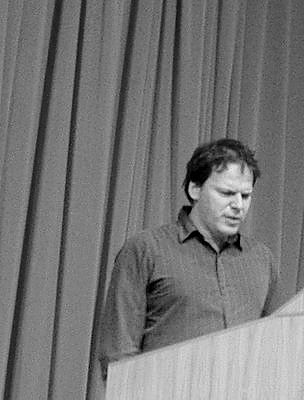A few hours ago I was shocked to read that David Graeber has died. He was only 59 years old. Graeber was one the most known and most original anthropologists in the world. He was one of the leading figures of the Occupy movement and got famous among the general public with his books on Debt and Bullshit Jobs.
There is still no official information about what happened besides from that he died in a hospital, according to his wife who tweeted:
Yesterday the best person in a world, my husband and my friend .@davidgraeber died in a hospital in Venice.
— Nika Dubrovsky (@nikadubrovsky) September 3, 2020
David Graeber has always been one of my favorite anthropologists. I liked the way he combined anthropology with activism and search for alternatives to capitalism and other oppressive ideologies and systems. One of the first pieces I read by him was Fragments of an Anarchist Anthropology. Everytime there was something in the news about him, I was eager to write about it (while I was still active blogging).

Photo: Lorenz Khazaleh
My first encounter with him was here on antropologi.info. He commented om some reviews about his Fragments of an Anarchist Anthropology that I linked to and criticized some of his points. Two years later, we met at a conference about anthropology and cosmopolitanism in Britain and chatted a bit about anthropology and the internet and probably also about conference culture. I stíll remember very well that his presentation was one of the highlights, not only because of its content (“Democracy is no Western invention“), but also because of his presentation style. In contrast to most other paper givers, he was actually able to communicate with the audience and use normal language to express complex ideas.
Three years after the conference, in 2009, we ended up in a little fight here on this blog. He had just just signed a petition calling for boycotting Israel and I had blogged about it, using his name in the headline. He did not like this exposure. On the one hand his reaction was surprising, on the other hand it was somehow understandable: His activism had caused him lots of trouble already. A few years before this blog post he was fired from Yale, most likely because of his activism.
The most recent publication by him that I enjoyed is the audio book of his bestseller Bullshit Jobs: A Theory. I listened to it on long walks last summer. “Such a wise book”, I often thought while listening. “You learn so much more than just about the book’s topic. I definitely should blog about it.”
Many more substantial texts have been written about David Graeber’s death already, see among others David Graeber: 1961-2020 by Greg Downey at Neuroanthropology who links to a long post with many videos on the website heavy.com: David Graeber Dead: Anthropologist & Anti-Capitalist Thinker Behind ‘We Are the 99%’ Slogan Dies at 59. Interestingly, all major news sites write about him, see Deutsche Welle: Anthropologist and Occupy activist David Graeber dies or New York Times: David Graeber, Caustic Critic of Inequality, Is Dead at 59 and last time I checked David Graeber, anthropologist and author of Bullshit Jobs, dies aged 59 has been the most read news story on The Guardian.
UPDATES:
Tribute by his friend and anthropologist Vito Laterza on facebook:
Two books stand out from his impressive intellectual production:
– “Debt: the first 5000 years” – a masterly history of debt and how it has been leveraged against people and communities in historical and contemporary perspective.
– “Bullshit jobs: a theory” – a wide-ranging critique of the current system of worth and valuation of jobs that would make you think very differently about the “virtues” of the uncontrolled growth of managerialism and digitalisation in today’s companies and organisations. This work is particularly important to understand the current moment. As David noted in a recent Politico op-ed, the pandemic has clearly shown that those who perform the most important jobs are paid the least.
Anarchist dissident and historian Andrej Grubacic: In loving memory of our friend, comrade, and mentor…David Graeber Including the introduction from the forthcoming Mutual Aid: An Illuminated Factor of Evolution by David Graeber and Andrej Grubačić:
When he died, David had just completed his most recent book, one on which he worked for several years. He teamed up with British archeologist David Wengrow to challenge some of the more stubborn assumptions of mainstream social science. This was one of the most ambitious projects David embarked upon, and it should be published in 2021.
In Memoriam David Graeber by focaalblog with comments by several anthropologists, among others Don Kalb, University of Bergen:
David was the most important anthropologist of his generation and by far its most brilliant and effective public intellectual. He reached wider audiences than anyone of us, possibly even larger than Margaret Mead in anthropology’s heydays. His message was as revolutionary as hers, if not more so. It announced nothing less than an anthropology that would research, critique, and go beyond capitalism.
Or by Alpa Shah, London School of Economics:
I often thought of David Graeber as a genius. But of the many things that David taught me, it was that there is in fact a genius in each of us. We can’t see this because we don’t have the collective structures to realise the brilliance within us, because we live in a world that violently excludes the many, that reserves the acquisition of individual heroism for the few, a world today driven by finance capital.
For David, anthropology was important for it was a means to resurrect other possible more beautiful worlds, imagine societies other than our own exclusive one, figure out the larger implications, and then offer those ideas back to the world for an anti-capitalist politics.
David Graeber’s Strength – beautiful tribute by Olivier Coulaux at the footnotes blog:
In your intellectual life, you can sometimes get lucky, and be pulled into writings that give you the wonderful feeling of being released from your intellectual routines and shackles. Numerous people have seen this rupture as the necessary condition to engage in reflexive work. I remember experiencing this feeling more than a few times during my initiation into anthropology, and Graeber’s oeuvre never failed to make me feel that way.
(…)
What is about Graeber’s work that makes you look at your everyday routine, and that makes you feel like re-discovering it for the first time? And what is it that makes that perspective so important?

A few hours ago I was shocked to read that David Graeber has died. He was only 59 years old. Graeber was one the most known and most original anthropologists in the world. He was one of the leading figures…


